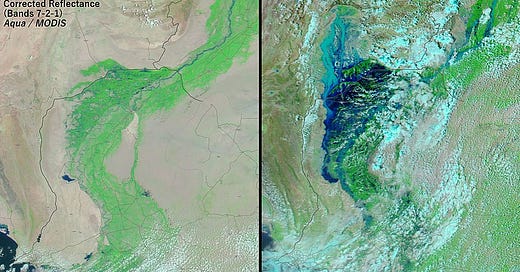Destabilized Saturday Edition #35
The climate transformation touches everything, Jan. 6th convict given US Capitol flag, echoes of the segregated South, Yvon Chouinard becomes an icon

Writing about the vast climate transformations underway around us forces me to learn new things. Frequently, I’ll have an idea for a newsletter only to find, as I start to write, that to write clearly there are key elements of the context I need to understand in much more depth. So I have to do my research and get up to speed.
In the process, I’ve realized there’s an immense amount of knowledge required to be fluent in climate change, climate impacts, and humankind’s efforts to adapt. It requires a threshold level of understanding not just of the core science but also of the rippling impacts of climate change on:
Weather patterns and weather extremes
The water cycle
Economies and prices
Global supply chains
Energy systems
Politics and political systems
International relations, national security, and war
Migration
History and patterns of previous human migrations
Human psychology and mental health
Families and children
Religion
Education
Art and culture
Demographics and population trends
Disease and public health
Technology and innovation (energy, CCS, desalination, cultivated meat, etc.)
Agriculture and global food systems
Soil mechanics and geotechnical engineering
Global topography
Global sun and wind patterns
The functioning of myriad human systems
Infrastructure
Construction processes and materials
Permitting, zoning, and building rules at multiple levels of government
Physical history of the earth
And much, much more…
Critically, it’s not just these areas of knowledge in isolation, it’s the near-infinite ways they interact and influence each other. It’s not possible to fully comprehend – or even just perceive – the civilizational metamorphosis climate change has set in motion. It’s far too vast.
It’s not much of an exaggeration to say climate change touches every aspect of human civilization and life on earth. In the words of climate futurist Alex Steffen, climate change is not an issue, it’s an era.
—
The impossibility of fully understanding climate change has real world consequences, and I’ll write about some of them soon.
My Work
Climate migration in America (link)
It’s impossible to predict how many of the billion or so people in India and Pakistan enduring this extreme heat will leave, but it will not be zero. If it’s 0.1% of the population, just one out of every thousand people, that would be one million. To get a sense of scale, the arrival in Europe of roughly that number of Syrian refugees in 2015 upended the continent’s politics, fueling the rise of authoritarian parties and giving the Brexit campaign a wind at its back.
Even if relatively few people leave this time, what about next time? That’s the unrelenting nature of the problem highly climate vulnerable places face: there will be a next time, a time after that, and a time after that.
Interesting Reads
The Climate Real Estate Bubble: Is the U.S. on the Verge of Another Financial Crisis? (link)
[T]his might be just the tip of the iceberg, experts say. In the future, more homeowners could default on their mortgages, driving down prices in communities even for those whose homes are less vulnerable. Banks might stop lending, depriving the community of the capital to recover. “Potentially, we’re looking at a wave of mortgage defaults that would be similar to the subprime crisis in how it would play out,” says Michael Craig, an economist at the Department of Housing and Urban Development. As disaster unfolds, homeowners in cities across the country might start considering their own climate risk and run for the hills.
Tweets of the Week
I had often wondered where the names of wildfires come from:




Extreme Weather Watch




For comparison, the state of Rhode Island covers 776,900 acres.


Creeping Authoritarianism Watch




This is a picture of an actual person who was at the January 6th assault on the Capitol:


Progress Joy and Hope












